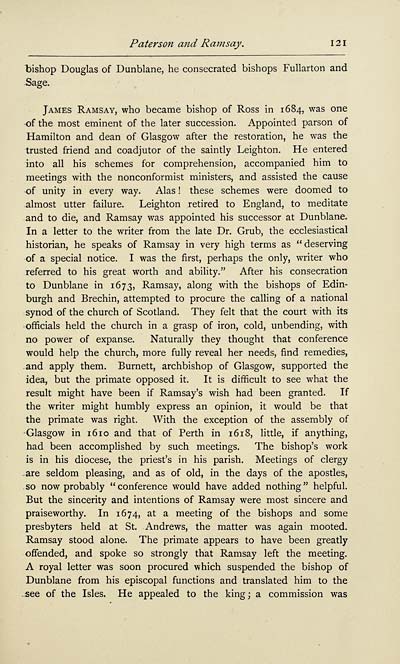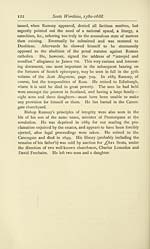Scots worthies, 1560-1688
(141) Page 121
Download files
Complete book:
Individual page:
Thumbnail gallery: Grid view | List view

Paterson and Ramsay. 121
bishop Douglas of Dunblane, he consecrated bishops Fullarton and
Sage.
James Ramsay, who became bishop of Ross in 1684, was one
of the most eminent of the later succession. Appointed parson of
Hamilton and dean of Glasgow after the restoration, he was the
trusted friend and coadjutor of the saintly Leighton. He entered
into all his schemes for comprehension, accompanied him to
meetings with the nonconformist ministers, and assisted the cause
of unity in every way. Alas ! these schemes were doomed to
almost utter failure. Leighton retired to England, to meditate
and to die, and Ramsay was appointed his successor at Dunblane.
In a letter to the writer from the late Dr. Grub, the ecclesiastical
historian, he speaks of Ramsay in very high terms as "deserving
•of a special notice. I was the first, perhaps the only, writer who
referred to his great worth and ability." After his consecration
to Dunblane in 1673, Ramsay, along with the bishops of Edin-
burgh and Brechin, attempted to procure the calling of a national
synod of the church of Scotland. They felt that the court with its
officials held the church in a grasp of iron, cold, unbending, with
no power of expanse. Naturally they thought that conference
would help the church, more fully reveal her needs, find remedies,
and apply them. Burnett, archbishop of Glasgow, supported the
idea, but the primate opposed it. It is difficult to see what the
result might have been if Ramsay's wish had been granted. If
the writer might humbly express an opinion, it would be that
the primate was right. With the exception of the assembly of
Glasgow in 16 10 and that of Perth in 16 18, little, if anything,
had been accomplished by such meetings. The bishop's work
is in his diocese, the priest's in his parish. Meetings of clergy
are seldom pleasing, and as of old, in the days of the apostles,
so now probably " conference would have added nothing " helpful.
But the sincerity and intentions of Ramsay were most sincere and
praiseworthy. In 1674, at a meeting of the bishops and some
presbyters held at St. Andrews, the matter was again mooted.
Ramsay stood alone. The primate appears to have been greatly
offended, and spoke so strongly that Ramsay left the meeting.
A royal letter was soon procured which suspended the bishop of
Dunblane from his episcopal functions and translated him to the
see of the Isles. He appealed to the king; a commission was
bishop Douglas of Dunblane, he consecrated bishops Fullarton and
Sage.
James Ramsay, who became bishop of Ross in 1684, was one
of the most eminent of the later succession. Appointed parson of
Hamilton and dean of Glasgow after the restoration, he was the
trusted friend and coadjutor of the saintly Leighton. He entered
into all his schemes for comprehension, accompanied him to
meetings with the nonconformist ministers, and assisted the cause
of unity in every way. Alas ! these schemes were doomed to
almost utter failure. Leighton retired to England, to meditate
and to die, and Ramsay was appointed his successor at Dunblane.
In a letter to the writer from the late Dr. Grub, the ecclesiastical
historian, he speaks of Ramsay in very high terms as "deserving
•of a special notice. I was the first, perhaps the only, writer who
referred to his great worth and ability." After his consecration
to Dunblane in 1673, Ramsay, along with the bishops of Edin-
burgh and Brechin, attempted to procure the calling of a national
synod of the church of Scotland. They felt that the court with its
officials held the church in a grasp of iron, cold, unbending, with
no power of expanse. Naturally they thought that conference
would help the church, more fully reveal her needs, find remedies,
and apply them. Burnett, archbishop of Glasgow, supported the
idea, but the primate opposed it. It is difficult to see what the
result might have been if Ramsay's wish had been granted. If
the writer might humbly express an opinion, it would be that
the primate was right. With the exception of the assembly of
Glasgow in 16 10 and that of Perth in 16 18, little, if anything,
had been accomplished by such meetings. The bishop's work
is in his diocese, the priest's in his parish. Meetings of clergy
are seldom pleasing, and as of old, in the days of the apostles,
so now probably " conference would have added nothing " helpful.
But the sincerity and intentions of Ramsay were most sincere and
praiseworthy. In 1674, at a meeting of the bishops and some
presbyters held at St. Andrews, the matter was again mooted.
Ramsay stood alone. The primate appears to have been greatly
offended, and spoke so strongly that Ramsay left the meeting.
A royal letter was soon procured which suspended the bishop of
Dunblane from his episcopal functions and translated him to the
see of the Isles. He appealed to the king; a commission was
Set display mode to:
![]() Universal Viewer |
Universal Viewer | ![]() Mirador |
Large image | Transcription
Mirador |
Large image | Transcription
Images and transcriptions on this page, including medium image downloads, may be used under the Creative Commons Attribution 4.0 International Licence unless otherwise stated. ![]()
| Histories of Scottish families > Scots worthies, 1560-1688 > (141) Page 121 |
|---|
| Permanent URL | https://digital.nls.uk/95152718 |
|---|
| Description | A selection of almost 400 printed items relating to the history of Scottish families, mostly dating from the 19th and early 20th centuries. Includes memoirs, genealogies and clan histories, with a few produced by emigrant families. The earliest family history goes back to AD 916. |
|---|

